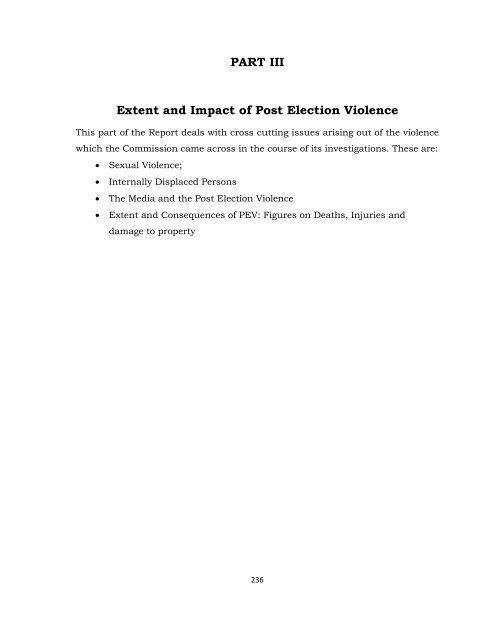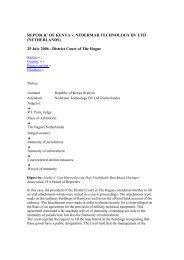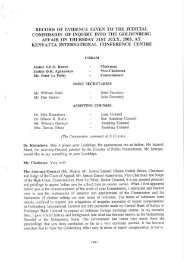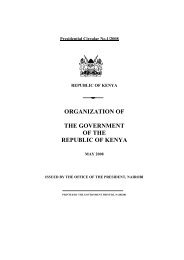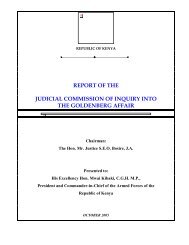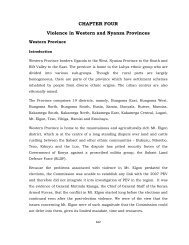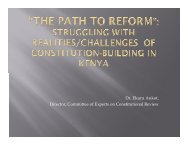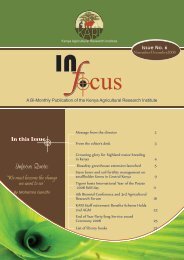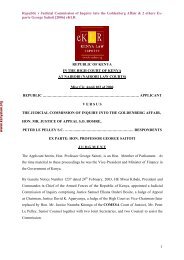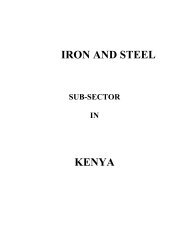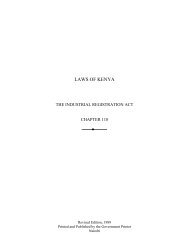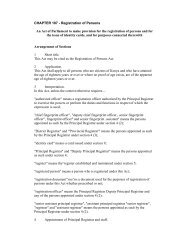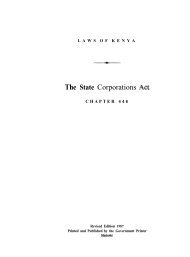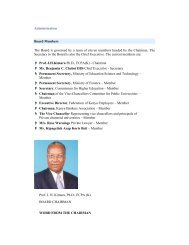PART III Extent and Impact of Post Election Violence - Mars Group ...
PART III Extent and Impact of Post Election Violence - Mars Group ...
PART III Extent and Impact of Post Election Violence - Mars Group ...
You also want an ePaper? Increase the reach of your titles
YUMPU automatically turns print PDFs into web optimized ePapers that Google loves.
<strong>PART</strong> <strong>III</strong><br />
<strong>Extent</strong> <strong>and</strong> <strong>Impact</strong> <strong>of</strong> <strong>Post</strong> <strong>Election</strong> <strong>Violence</strong><br />
This part <strong>of</strong> the Report deals with cross cutting issues arising out <strong>of</strong> the violence<br />
which the Commission came across in the course <strong>of</strong> its investigations. These are:<br />
• Sexual <strong>Violence</strong>;<br />
• Internally Displaced Persons<br />
• The Media <strong>and</strong> the <strong>Post</strong> <strong>Election</strong> <strong>Violence</strong><br />
• <strong>Extent</strong> <strong>and</strong> Consequences <strong>of</strong> PEV: Figures on Deaths, Injuries <strong>and</strong><br />
damage to property<br />
236
Introduction<br />
CHAPTER SIX<br />
Sexual <strong>Violence</strong><br />
One <strong>of</strong> the well known <strong>and</strong> regrettable tragedies <strong>of</strong> major conflicts <strong>and</strong><br />
breakdowns <strong>of</strong> law <strong>and</strong> order is sexual violence. This has happened around the<br />
world. Sadly enough, it also was a consequence <strong>of</strong> the 2007 post election<br />
violence in Kenya. Like others who either lived through or followed this terrible<br />
period <strong>of</strong> Kenya’s history, the Commission heard anecdotally <strong>and</strong> from the media<br />
about sexual violence against both women <strong>and</strong> men. These reports, admittedly<br />
informal, included heart wrenching tales <strong>of</strong> rape, gang rape, sexual mutilation,<br />
loss <strong>of</strong> body parts, <strong>and</strong> hideous deaths. In addition, the Commission also<br />
gradually learned that the various forms <strong>of</strong> genital violence against innocent<br />
victims were not just one-<strong>of</strong>f tragedies but major life-changing events. Among<br />
others, the Commission heard tales <strong>of</strong> family members being forced to st<strong>and</strong> by<br />
<strong>and</strong> witness their mothers, fathers, sisters, brothers, <strong>and</strong> little children being<br />
raped, killed, <strong>and</strong> maimed: innocent victims contracting HIV AIDS after being<br />
sexually assaulted because the breakdown <strong>of</strong> law <strong>and</strong> order <strong>and</strong> the<br />
deteriorating security situation kept them from accessing medical care soon<br />
enough to prevent it: husb<strong>and</strong>s ab<strong>and</strong>oning their wives who had been defiled,<br />
<strong>and</strong> the inevitable psychological burden <strong>of</strong> powerlessness <strong>and</strong> hopelessness that<br />
left individuals who had experienced sexual violence feeling alone, isolated, <strong>and</strong><br />
unable to cope, not just for one moment in time, but possibly forever. Worse still,<br />
the Commission also heard that some individuals who had lost family members<br />
<strong>and</strong> property, <strong>and</strong> who had been chased away from the only homes they had<br />
ever known, also had experienced multiple forms <strong>of</strong> violence that included sexual<br />
violence.<br />
Hearing bits <strong>and</strong> pieces <strong>of</strong> these life shattering experiences alerted the<br />
Commission to the need to make its inquiries into the sexual violence that<br />
occurred following the 2007 election a central focus <strong>of</strong> its investigation into post<br />
237
election violence. At the very least the Commission thought it would be<br />
appropriate to look in depth into the sexual violence that had occurred. Its<br />
reasoning was tw<strong>of</strong>old. First, sexual violence is a form <strong>of</strong> violence <strong>and</strong> as the<br />
Commission was about violence, it felt strongly that there should be a focus on it<br />
in the Commission’s investigations. Secondly, being ordinary lay people from<br />
various walks <strong>of</strong> life, the members <strong>of</strong> the Commission also were personally<br />
horrified by the stories <strong>of</strong> sexual violence that came to our attention. Like others,<br />
members <strong>of</strong> the Commission too felt compassion for the victims <strong>of</strong> post election<br />
sexual violence <strong>and</strong> wanted to learn <strong>and</strong> expose what had happened. The<br />
Commission also felt that it should do something to make sure that the scourge<br />
<strong>of</strong> sexual violence that happened after the election did not become an endemic in<br />
Kenyan life that, could be one day could recur in the lives <strong>of</strong> ordinary people.<br />
The Commission felt it needed to explore the situation given that like others it<br />
only heard isolated stories <strong>and</strong> did not know anything concrete about the sexual<br />
violence that happened. The Commission sought to the best <strong>of</strong> its ability to<br />
answer four basic questions to fulfil its m<strong>and</strong>ate to explore the full extent <strong>of</strong><br />
violence that Kenya had experienced, including sexual violence. First, the<br />
Commission wanted to know whether sexual violence actually had taken place.<br />
Secondly, the Commission wanted to know exactly what had occurred, how it<br />
manifested, <strong>and</strong> its extent. Third, the Commission wanted to underst<strong>and</strong>, how<br />
<strong>and</strong> why it happened, <strong>and</strong> fourth what evidence there was for all <strong>of</strong> the above.<br />
Being lay people rather than specialists in the subject <strong>of</strong> sexual violence,<br />
members <strong>of</strong> the Commission understood that not only did they not have the<br />
answers to the above questions, but that they also did not know how to go about<br />
getting them. The Commission realized that while armed with reasonable<br />
questions <strong>and</strong> good intentions, it could not embark on this inquiry alone. The<br />
Commission needed assistance from specialists who knew Kenya’s social <strong>and</strong><br />
political l<strong>and</strong>scape, were familiar with the history, causes <strong>and</strong> nature <strong>of</strong> sexual<br />
violence in general, <strong>and</strong> who had worked with victims <strong>of</strong> such violence. The<br />
Commission knew that while women normally are the main victims <strong>of</strong> sexual<br />
238
violence when order breaks down, men too had experienced horrid types <strong>of</strong><br />
sexual violence after the Kenyan election. These included sodomy, forced<br />
circumcision, <strong>and</strong> even mutilation <strong>of</strong> their penises. Between hearing <strong>of</strong> women<br />
who had been gang raped <strong>and</strong> mutilated, the accounts <strong>of</strong> ethnically driven<br />
sexual violence against certain men was also horrifying. Furthermore, the<br />
Commission also understood that any inquiries it might make into sexual<br />
violence would also involve interacting with victims. The Commission<br />
appreciated all the sensitivities associated with doing so, including the usual<br />
problem <strong>of</strong> finding victims who would agree to discuss what had happened to<br />
them.<br />
The Commission wanted to make its inquiries into sexual violence part <strong>and</strong><br />
parcel <strong>of</strong> all <strong>of</strong> its investigations into the post election violence that engulfed<br />
Kenya after the 2007 election. The Commission knew, however, that to do so it<br />
would need the help <strong>of</strong> experts. Fortunately, there are a number <strong>of</strong> groups in<br />
Kenya who work around the theme <strong>of</strong> sexual violence. These agreed to assist in<br />
all parts <strong>of</strong> the Commission’s work, both before the Commission took evidence in<br />
Nairobi <strong>and</strong> while gathering testimony in the countryside. In Nairobi, the<br />
Commission held three planning meetings with civil society organizations that<br />
address sexual violence, including those who had worked on these matters after<br />
the elections in Kenya. In the middle <strong>of</strong> the crisis, forty organizations in Kenya<br />
came together to reach out to women <strong>and</strong> others who had experienced sexual<br />
violence following the 2007 elections. They gathered under the auspices <strong>of</strong> the<br />
Inter-Agency Gender Based <strong>Violence</strong> sub-cluster co-chaired by the United<br />
Nations Fund for Population Activities (UNFPA) <strong>and</strong> the National Commission on<br />
Gender <strong>and</strong> Development. This umbrella group included a variety <strong>of</strong> different<br />
groups from departments in the ministries <strong>of</strong> gender <strong>and</strong> health, <strong>and</strong> the<br />
judiciary, various UN agencies (e.g. UNFPA, the United Nations Development<br />
Fund for Women (UNIFEM)), the Red Cross <strong>and</strong> Red Crescent Movement, <strong>and</strong><br />
from various local <strong>and</strong> international non-governmental organizations (NGOS).<br />
Even before the Commission began its sessions, the sub-cluster had responded<br />
to the post-election sexual violence, particularly against women, including<br />
239
providing victims with medical, psycho-social <strong>and</strong> other counselling services.<br />
Hence the sub-cluster was in a unique position to help the Commission with its<br />
work <strong>and</strong> did so.<br />
During consultations with the SGBV sub-cluster, the Commission was able to<br />
ask them questions about how sexual violence manifested, where the<br />
Commission might find evidence <strong>of</strong> it, <strong>and</strong> how it should go about collecting this<br />
evidence. The Commission also decided internally that matters relating to sexual<br />
violence would be an integral part <strong>of</strong> its inquiry into the post-election violence.<br />
As Justice Philip Waki, the Chairman <strong>of</strong> the Commission noted on the first day<br />
<strong>of</strong> the Commission’s hearings, sexual violence is “silent” <strong>and</strong> “preying” because<br />
it is “underreported, under-investigated <strong>and</strong> …insufficiently addressed”, also<br />
adding that the Commission would focus on it in all parts <strong>of</strong> our investigation,<br />
declaring ourselves open to “receive any credible information <strong>and</strong> evidence from<br />
survivors”. 201<br />
The Commission realized that it probably would be easier to find out what had<br />
happened in Nairobi than in the countryside, where lack <strong>of</strong> anonymity <strong>and</strong> fear<br />
<strong>of</strong> speaking to the Commission might be a greater problem. The Commission also<br />
understood that if all testimony from victims <strong>of</strong> post-electoral sexual violence<br />
was taken in private rather than in public, the issue <strong>of</strong> sexual violence against<br />
women in the post-election period might get lost <strong>and</strong> never be discussed or<br />
flagged to the general public. To pre-empt these <strong>and</strong> other potential problems,<br />
the Commission took five major steps. First, to help locate <strong>and</strong> speak to victims<br />
<strong>of</strong> post-election sexual violence in various parts <strong>of</strong> Kenya, the Commission<br />
enlisted assistance from UNFPA <strong>and</strong> UNIFEM as well as from four sub-cluster<br />
members. They included CARE Kenya, FIDA Kenya, the Kenya Women<br />
Empowerment Link, <strong>and</strong> the Catholic Diocese <strong>of</strong> Nakuru. As a part <strong>of</strong> this effort,<br />
CARE did a study in the slums <strong>of</strong> Kibera <strong>and</strong> Mathare, while the Centre for<br />
Rights Education <strong>and</strong> Awareness (CREAW) did another <strong>and</strong> also produced a<br />
201 CIPEV Hansard, Vol. 1, pp. 1, 238.<br />
240
documentary about sexual violence in the Rift Valley. CARE Kenya also held a<br />
workshop for victims <strong>of</strong> sexual violence to explain what the Commission was<br />
doing <strong>and</strong> to find out who among them might be willing to testify before. Further,<br />
they provided counselling services to women <strong>and</strong> prepared them to testify before<br />
the Commission in addition to giving the Commission some recommendations to<br />
be followed when victims, most <strong>of</strong> whom were women, appeared before the<br />
Commission. Secondly, to ensure that the work on sexual violence was culturally<br />
sensitive <strong>and</strong> to allow the Commission to contact specialists as needed, the Sub-<br />
Cluster set up a committee, including a resident gender expert from UNIFEM, to<br />
work with the Commission’s investigators, <strong>and</strong> to identify <strong>and</strong> prepare victims<br />
who wanted to testify to the Commission.<br />
Thirdly, to encourage victims <strong>of</strong> sexual violence to come before the Commission<br />
<strong>and</strong> to make it less painful for them to speak to investigators <strong>and</strong> to the<br />
Commission, the Commission hired two female investigators who had experience<br />
in dealing with sexual violence against women in particular. They included one<br />
international police investigator <strong>and</strong> one Kenyan lawyer. Fourthly, the<br />
Commission made it a point to allow two lawyers to take part in its proceedings,<br />
who had experience in dealing with gender issues, the Federation <strong>of</strong> Women<br />
Lawyers (FIDA) <strong>and</strong> the Centre for Advancement <strong>of</strong> Women <strong>and</strong> Children 202. They<br />
had opportunity to examine every witness appearing before the Commission,<br />
including government <strong>of</strong>ficials, the police, victims, <strong>and</strong> other interested parties,<br />
throughout our meetings all over the country. Their questions added another<br />
dimension to the Commission’s underst<strong>and</strong>ing <strong>of</strong> what had happened to women<br />
<strong>and</strong> other victims <strong>of</strong> sexual violence <strong>and</strong> the extent to which the government <strong>and</strong><br />
others had assisted or failed to assist those in need. Fifthly, fully cognizant <strong>of</strong> the<br />
potential challenge <strong>of</strong> asking someone who had experienced sexual violence to<br />
relive it by testifying before the Commission decided to hire a full time<br />
202 The Commission granted FIDA a limited st<strong>and</strong>ing as an intervener on 15 July 2008 <strong>and</strong> the Centre for the<br />
Advancement <strong>of</strong> Women <strong>and</strong> Children on 29 July 2008. Their terms are discussed in CIPEV, Hansard, vol 1, 9‐25 July<br />
2008, p.228 <strong>and</strong> vol. 2, Naivasha, 28‐29 July 2008, p.1128.<br />
241
psychologist to interact with <strong>and</strong> assist victims both before, during, <strong>and</strong> after<br />
they testified to the Commission.<br />
Collecting Evidence<br />
This Commission is the first investigation <strong>of</strong> electoral violence to focus on sexual<br />
violence. This contrasts with the Kiliku <strong>and</strong> Akiwumi Commissions which did<br />
not address it. As such, the Commission was in uncharted territory. Not only did<br />
it seek advice as noted above, but also tried to take account <strong>of</strong> the difficulty<br />
victims faced in coming forward. Some told the cluster group or investigators<br />
that they were ashamed <strong>of</strong> what had happened to them <strong>and</strong> did not want to<br />
discuss their experiences in public, fearing further humiliation. Others worried<br />
that if they testified in the open, their attackers might retaliate against them, as<br />
this increased the possibility <strong>of</strong> them being identified.<br />
Underst<strong>and</strong>ing that potential witnesses had suffered incalculable physical <strong>and</strong><br />
psychological horrors from which they might never recover, the Commission<br />
arranged for private hearings, which also allowed victims to describe what had<br />
happened to them <strong>and</strong> enabled them to open up, in some cases to the point <strong>of</strong><br />
naming their attackers. In short, the Commission <strong>and</strong> the Kenyan victims <strong>of</strong><br />
sexual violence encountered issues similar to those faced elsewhere in the world<br />
when dealing with its aftermath. Even then, with all <strong>of</strong> the efforts to sensitize<br />
members <strong>of</strong> the Commission <strong>and</strong> provide a safe environment in which victims<br />
could testify, it was still difficult for victims to steel themselves <strong>and</strong> come forth to<br />
meet with the Commission. This accounts for the relatively small number <strong>of</strong><br />
victims, 31 in all, who testified before the Commission or submitted statements,<br />
something the Commission understood <strong>and</strong> appreciated, but nevertheless regret<br />
given the strong belief by the Commission that the problem <strong>of</strong> sexual <strong>and</strong><br />
gender based violence in the post election period merited more time in the<br />
Commission hearings. This not so unusual problem may also have been<br />
accentuated by the sad history <strong>of</strong> Kenya’s past electoral violence <strong>and</strong> the reality<br />
that perpetrators have not only gone unpunished, but have continued afterwards<br />
as powerful political figures. That sobering reality as well as the relative<br />
242
powerlessness <strong>of</strong> Kenyan women in many areas <strong>of</strong> life may have made potential<br />
witnesses shy away after considering that the potential cost <strong>of</strong> their testimony<br />
far outweighed any perceived expectations that they may have had for obtaining<br />
justice.<br />
Furthermore, some cases <strong>of</strong> sexual violence against men that took place after the<br />
2007 elections were hitherto unheard <strong>of</strong> <strong>and</strong> new to the Commission <strong>and</strong> to<br />
Kenya. The tragic novelty <strong>of</strong> this experience meant that there were even fewer<br />
support groups available to men than to women. That, added to the humiliation<br />
<strong>of</strong> the violations meant that no male victims came forward to testify to the<br />
Commission, something the Commission understood, but nevertheless found<br />
regrettable.<br />
The Commission heard from witnesses, some <strong>of</strong> whom were specialists or had<br />
treated victims <strong>of</strong> sexual violence, <strong>and</strong> others who were victims. The former<br />
testified in public about the character, magnitude, <strong>and</strong> extent <strong>of</strong> the violence.<br />
This permitted the Commission to learn much about what had happened,<br />
approximately how many people were affected, <strong>and</strong> how various organizations<br />
had responded in the face <strong>of</strong> this crisis. Others, mainly victims, testified mostly<br />
in private. The private hearings began in Nairobi after which the Commission<br />
heard from victims <strong>of</strong> sexual violence in Naivasha, Nakuru, Eldoret, Kisumu, <strong>and</strong><br />
Mombasa, but not in Kisii where no victims came forth.<br />
Public Testimony by Expert Witnesses<br />
The Commission received testimony from three specialists on sexually based<br />
violence, most <strong>of</strong> whose work has been with female victims. These were: Millicent<br />
Obaso, 203 a Sexual <strong>and</strong> Gender Based <strong>Violence</strong> Advisor for CARE International<br />
who also is an HIV/AIDS Advisor for East <strong>and</strong> Central Africa; Jane Onyango, the<br />
Executive Director <strong>of</strong> FIDA Kenya; <strong>and</strong> Dr. Sam Thenya, an obstetrician<br />
gynaecologist, <strong>and</strong> Chief Executive Officer <strong>of</strong> the Nairobi Women’s Hospital which<br />
established a Gender <strong>Violence</strong> Recovery Centre (CVRC) in 2001 that has been a<br />
203 CW 10<br />
243
Mecca for women. They discussed the post election sexual violence in Kenya<br />
between December 2007 <strong>and</strong> March 2008 <strong>and</strong> their encounters with it. They told<br />
the Commission that sexual violence was rampant during this period consisting<br />
mainly <strong>of</strong> rape <strong>and</strong> gang rape, defilement, genital mutilation, sodomy, forced<br />
circumcision, <strong>and</strong> sexual exploitation.<br />
Millicent Obaso’s testimony discussed the horrific experiences <strong>of</strong> women in<br />
Kibera <strong>and</strong> Mathare where her organization had worked. There her organization<br />
collected information from 40 victims, <strong>and</strong> analysed in depth the cases <strong>of</strong> 13 <strong>of</strong><br />
these victims. She the Commission that most victims were poor women who had<br />
been raped in their own homes by youth, gangs <strong>of</strong> up to 20 men, GSU personnel<br />
,<strong>and</strong> some police <strong>of</strong>ficers. The victims ranged in age from 25-68 with over 62%<br />
being married, widowed or divorced, <strong>and</strong> 38% single. Slightly over 61% had<br />
attended primary school, 15 % secondary school, <strong>and</strong> 23% had never been to<br />
school at all. Most were still homeless or living in IDP camps, having lost their<br />
possessions, livelihoods, <strong>and</strong> homes. Ms. Obaso recounted several terrible tales<br />
from victims <strong>of</strong> sexual violence which not only hit women worst but which she<br />
told the Commission, was the direct consequence <strong>of</strong> existing inequalities<br />
between men <strong>and</strong> women in Kenya, <strong>and</strong> something that affected the way in<br />
which husb<strong>and</strong>s responded to the rapes <strong>of</strong> their wives <strong>and</strong> daughters. She<br />
explained that over 75% <strong>of</strong> the individuals her group interviewed said they had<br />
been raped at home in front <strong>of</strong> their spouses <strong>and</strong> children, causing a great deal<br />
<strong>of</strong> stress that resulted in their being ab<strong>and</strong>oned by their husb<strong>and</strong>s. As she<br />
explained, “the man came, the father <strong>of</strong> the house <strong>and</strong> when he found that his<br />
wife had been raped <strong>and</strong> the same man raped his daughter <strong>and</strong> rapes his<br />
daughter-in law, he said I am finished with [this]; I cannot deal with this. I am<br />
going to find myself another woman, [b]ecause this is the biggest taboo in my<br />
home <strong>and</strong> I cannot even be cleansed <strong>and</strong> who are the perpetrators” 204<br />
204 CW 10, with the remainder <strong>of</strong> this witnesses discussion <strong>and</strong> quotations drawn from pp. 233‐42<br />
244
The witness told the Commission that ab<strong>and</strong>onment after being raped,<br />
sometimes by up to 20 men, was just the beginning <strong>of</strong> the horror visited on these<br />
women. Most who were left had no place to go, the majority did not report what<br />
had happened with the police or their chiefs, <strong>and</strong> when they did many were<br />
received with hostility or turned away. Some contracted HIV AIDs because they<br />
could not get to hospital in time to receive post-exposure prophylaxis (PEP), a<br />
drug which the Commission was informed prevents HIV infection if administered<br />
in time, while others who were already infected with HIV/AIDS were unable to<br />
get their daily doses <strong>of</strong> anti-retroviral drugs (ARVS) to manage the disease,<br />
others became pregnant as a result <strong>of</strong> the violations. Furthermore, the witness<br />
told the Commission that some women were disabled <strong>and</strong> when they were being<br />
interviewed they could not walk properly while others who did not receive proper<br />
treatment, still had blood streaming down their legs which was visible to their<br />
children.<br />
Ms. Obaso told the Commission that she felt these terrible violations against<br />
women needed to be taken very seriously <strong>and</strong> made recommendations including<br />
implementing the Sexual Offences Act, developing guidelines for police,<br />
compensating women, providing psychosocial support to them <strong>and</strong> their families,<br />
“looking at these women as human beings while...finding their perpetrators”, <strong>and</strong><br />
passing on the experiences <strong>of</strong> what happened to women to the Truth <strong>and</strong><br />
Reconciliation Commission.<br />
Jane Onyango 205, testified about the work <strong>of</strong> FIDA in IDP camps in Nairobi,<br />
Nakuru, Eldoret, Mombasa, <strong>and</strong> Kisumu Kenya that included legal aid,<br />
counselling <strong>and</strong> humanitarian services which they provided to women <strong>and</strong><br />
children living in very poor, congested <strong>and</strong> insecure conditions. She told the<br />
Commission that these conditions encouraged further sexual violence. She<br />
reiterated similar experiences as those recounted by Ms Obaso: gang rapes, fear<br />
<strong>of</strong> reporting to the Commission either in private or public, inability to access<br />
205 CW 11<br />
245
police stations, loss <strong>of</strong> property, homes, legal documents <strong>and</strong> possessions, <strong>and</strong><br />
ab<strong>and</strong>onment by their husb<strong>and</strong>s. One woman in Mathare, who was already HIV<br />
positive, who had returned home to stay safe after being chased by a gang, she<br />
experienced the terror <strong>of</strong> her house being knocked down by another mob who<br />
proceeded to gang raped her before she passed out. In another case, a Luhya<br />
woman married to a Kikuyu was ab<strong>and</strong>oned by her husb<strong>and</strong> on 30 December.<br />
He returned two days later <strong>and</strong> threatened to kill her, <strong>and</strong> sodomize her, saying<br />
he regretted marrying a Luhya, he threw her belongings out <strong>of</strong> their house, <strong>and</strong><br />
refused to let her see her children. Ms. Onyango also told the Commission that<br />
women are traditionally seen as lesser human beings something that propels<br />
sexual violence <strong>and</strong> the insensitive response <strong>of</strong> the police which leads to victims’<br />
fears <strong>of</strong> reporting, believing they could be turned away or even killed for doing<br />
so.<br />
The Commission also received testimony from Dr. Regina Karega 206, the<br />
chairwoman <strong>of</strong> Kenya’s National Commission on Gender <strong>and</strong> Development,<br />
which came into existence in 2004. She made a number <strong>of</strong> suggestions about<br />
measures which she felt would increase the likelihood <strong>of</strong> perpetrators <strong>of</strong> sexual<br />
violence being charged. These included having mobile courts <strong>and</strong> increasing the<br />
number <strong>of</strong> centres for victims <strong>of</strong> conflict both to assist <strong>and</strong> protect them. Michael<br />
Gachanja Wachira 207, a program <strong>of</strong>ficer with the Centre for Rights, Education,<br />
<strong>and</strong> Awareness (CREAW) presented a DVD <strong>of</strong> women in the Rift Valley who<br />
voiced their experiences concerning sexual violence after the 2007 election. He<br />
also gave the Commission a presentation based on an in depth study<br />
undertaken in Nairobi, Nakuru, Burnt Forest <strong>and</strong> Eldoret from the end <strong>of</strong><br />
January through 25 April 2008. The Commission was interested to learn that<br />
82% <strong>of</strong> the victims did not formally report their experiences <strong>of</strong> sexual violence,<br />
especially to the police. The Commission was told that the reasons for non-<br />
reporting ranged from having been attacked by the police (32%), fear <strong>of</strong> being<br />
attacked again (24%), thinking nothing would be done (45%), <strong>and</strong> not being able<br />
206 CW12<br />
207 CW13<br />
246
to identify the rapist (31%). Others, the Commission was told, did not know<br />
where to report the incident, had been asked not to report the matter (34%), or<br />
did not know how to do so (27%). The witness told the Commission that some<br />
respondents, especially those raped by powerful figures in authority, including<br />
police, who had sexually assaulted women, were effectively untouchable. This<br />
finding mirrored other testimony given to the Commission concerning the<br />
response both by government <strong>and</strong> security personnel to other types <strong>of</strong> post-<br />
election violence. The very individuals who might have helped them were people<br />
to whom they could not go for help: perpetrators at the worse <strong>and</strong> otherwise<br />
<strong>of</strong>ten indifferent byst<strong>and</strong>ers to the plight <strong>of</strong> ordinary citizens whom they should<br />
have assisted. The witness also testified that some women in IDP camps in<br />
Naivasha were reduced to trading sex for money to buy food for their families<br />
while others were raped by individuals who invaded IDP camps as was the case<br />
in Nakuru, or did not have access to medical services. 208<br />
Dr. Sam Thenya 209, the CEO <strong>of</strong> the Nairobi Women’s Hospital, which provides<br />
free services to female <strong>and</strong> male victims <strong>of</strong> sexual violence, explained to the<br />
Commission that his hospital <strong>of</strong>fers comprehensive treatment to survivors <strong>of</strong><br />
sexual violence, including administering a drug, known as <strong>Post</strong> Exposure<br />
Prophylaxes (PEP) medication which if given within 72 hours <strong>of</strong> rape reduces the<br />
chances <strong>of</strong> the victim being infected with HIVAIDS <strong>and</strong> other sexually<br />
transmitted diseases (STDs). He also relayed to the Commission the other types<br />
<strong>of</strong> services <strong>of</strong>fered by his hospital including psychological <strong>and</strong> mental health <strong>and</strong><br />
other services.<br />
Dr. Sam Thenya told the Commission that his hospital was inundated with<br />
patients during the post election period. It treated 653 individuals to whom it<br />
was able to <strong>of</strong>fer comprehensive services, including the administration <strong>of</strong> PEP.<br />
This number excludes others who came to the hospital after the 72 hour period<br />
when PEP is in effective as the hospital’s statistics include only those who<br />
208 Exhibit 12 B.<br />
209 CW 14<br />
247
eceive its “comprehensive services”, therefore to some extent not fully taking<br />
account <strong>of</strong> the total number <strong>of</strong> individuals who came to the hospital to be treated<br />
for sexual violence. Adding in those treated at other hospitals in other parts <strong>of</strong><br />
the country with whom he partners, Dr. Thenya testified to us that at least 900<br />
individuals were treated, noting this was the just the “tip <strong>of</strong> the iceberg”. Many<br />
more victims <strong>of</strong> sexual violence could not get to his or other hospitals to obtain<br />
treatment given the lack <strong>of</strong> security <strong>and</strong> means <strong>of</strong> transport when law <strong>and</strong> order<br />
broke down. This was an additional tragedy Dr. Thenya relayed to the<br />
Commission, adding to the Commission’s underst<strong>and</strong>ing <strong>of</strong> the ways in which<br />
sexual violence <strong>and</strong> the results <strong>of</strong> post election violence intersected. For those on<br />
whom Dr. Thenya had collected data, 524 or 80% suffered from rape <strong>and</strong><br />
defilement, 65 or 10% from domestic violence with the remaining 10% from<br />
other types <strong>of</strong> physical <strong>and</strong> sexual assault. The majority <strong>of</strong> the patients were<br />
women, even though the hospital treated a small number <strong>of</strong> males who had been<br />
sodomized <strong>and</strong> subjected to other form <strong>of</strong> sexual brutalization. About half <strong>of</strong> the<br />
524 were adults <strong>and</strong> the other half were children with 207 knowing their<br />
attackers. The majority <strong>of</strong> the attackers were known but not named, followed by<br />
neighbors, relatives, <strong>and</strong> friends. Of the patients coming to the Nairobi Women’s<br />
Hospital, 58% were from Nairobi, with the rest coming from Kiambu, Nakuru,<br />
Naivasha, Eldoret, Makueni, Machakos, <strong>and</strong> Ongata Rongai. 210<br />
Dr. Margaret Makanyengo, a Consultant Psychiatrist <strong>and</strong> Head <strong>of</strong> the<br />
Department <strong>of</strong> Mental Health Services <strong>and</strong> the Gender Based <strong>Violence</strong> Recovery<br />
Centre (GBVRC), 211also testified <strong>and</strong> said that their GBVRC acted as a “one stop<br />
shop” <strong>of</strong>fering psychological <strong>and</strong> mental health services to victims <strong>of</strong> sexual<br />
violence. From December 2007 to June 2008 they recorded 184 cases <strong>of</strong> sexual<br />
violence, 80% <strong>of</strong> which stemmed from the post election situation. Ironically, the<br />
Commission heard that in January <strong>and</strong> February, at the height <strong>of</strong> the violence,<br />
the numbers <strong>of</strong> patients they saw actually dipped, something the witness<br />
210 The figures come from Dr. Thenya’s testimony <strong>and</strong> from Exhibits 14 A‐C<br />
211 CW 23<br />
248
attributed to the lack <strong>of</strong> transport <strong>and</strong> the general level <strong>of</strong> insecurity in the city.<br />
Here she echoed the statements <strong>of</strong> other witnesses.<br />
Notwithst<strong>and</strong>ing the abundance <strong>of</strong> information the Commission received about<br />
the nature, numbers, <strong>and</strong> manifestations <strong>of</strong> post election sexual violence from<br />
the above organizations <strong>and</strong> from other witnesses, the Commissioner <strong>of</strong> Police,<br />
Major General Hassan Ali 212 had told the Commission the police had not<br />
collected any information or statistics on crimes such as rapes. 213 Given the<br />
evidence adduced by the witnesses above <strong>and</strong> the victims <strong>of</strong> sexual violence<br />
against the police, the Commission was concerned over the apparent lack <strong>of</strong><br />
interest <strong>of</strong> the police in sexual violence in general <strong>and</strong> particularly in not taking<br />
action against their own <strong>of</strong>ficers who perpetrated the crimes.<br />
Testimony from Victims<br />
The Commission received testimony from victims <strong>of</strong> sexual violence in public, in<br />
private, from statements collected by investigators, including those from victims<br />
who did not wish to appear before the Commission but nevertheless wanted their<br />
stories heard. The Commission also obtained records <strong>of</strong> interviews given to other<br />
organizations including those headed by the specialists above, who testified<br />
before the Commission. This included evidence from women, men, girls <strong>and</strong> boys<br />
who were raped, sodomized, <strong>and</strong> had their genitals mutilated. It is noted that<br />
women <strong>and</strong> girls were the majority <strong>of</strong> those affected.<br />
The Commission <strong>and</strong> its investigators collected testimonies <strong>and</strong> statements from<br />
many different parts <strong>of</strong> Kenya even though was difficult to access victims in IDP<br />
camps, particularly once the government began its program <strong>of</strong> to resettle IDPs,<br />
“Operation Rudi Nyumbani” which made it more difficult for the Commission to<br />
trace, reach, or obtain information from victims.<br />
212 CW 1<br />
213 CW 1<br />
249
The people whom the Commission heard from in direct evidence <strong>and</strong> from<br />
statements to investigators are real people with real lives. The combined horror<br />
<strong>of</strong> post election <strong>and</strong> sexual violence they experience has destroyed their lives.<br />
What began as one horror <strong>and</strong> one loss was quickly compounded into many.<br />
These experiences continue to overwhelm those who heard them, including the<br />
Commission. Mass violence can easily be reduced to anomic numbers. While<br />
numbers are necessary to pr<strong>of</strong>ile the sexual violence that occurred after the<br />
2007 election, they also can turn tragic histories <strong>of</strong> normal people into a sea <strong>of</strong><br />
faceless anonymity if viewed in isolation. To avoid this <strong>and</strong> to retain the human<br />
face <strong>of</strong> the post election sexual violence experienced by its victims, the<br />
Commisison did its best to encourage victims <strong>of</strong> sexual violence to come <strong>and</strong> tell<br />
about their experiences.<br />
Hence, following the presentation <strong>of</strong> figures compiled by the Commission to help<br />
in synthesizing what happened, the rest <strong>of</strong> this chapter tells the story <strong>of</strong> post<br />
election violence through the eyes <strong>of</strong> the victims who testified to the<br />
Commission, mostly in camera. The chapter consists in either summarizing what<br />
they told the Commission or using direct quotes from their testimonies <strong>and</strong><br />
statements to the Commission to illustrate broader points.<br />
Who Were the Victims <strong>of</strong> Sexual <strong>Violence</strong>?<br />
The demographic characteristics <strong>of</strong> the victims <strong>of</strong> post-election sexual violence<br />
who testified <strong>and</strong> whom the Commission’s investigators interviewed are as<br />
follows. 214 The Commission received statements from a total <strong>of</strong> 31 women<br />
ranging in age from 17-55 years old, some <strong>of</strong> whom testified in private <strong>and</strong><br />
others <strong>of</strong> whom just gave statements the Commission’s investigators, but did not<br />
appear before the Commission. Many were victims <strong>of</strong> other aspects <strong>of</strong> post<br />
election violence including being forced to flee from their homes, having their<br />
214 The figures here were compiled from data collected by a Commission investigator working on sexual <strong>and</strong> gender<br />
based violence.<br />
250
property destroyed, losing their family members, <strong>and</strong> suffering from other types<br />
<strong>of</strong> violence. Twelve <strong>of</strong> the thirty came from Nairobi, two from Naivasha, six from<br />
Nakuru, four from Eldoret, six from Kisumu, one from Mombasa, but none from<br />
Kisii, even though sexual violence occurred there too. While the Commission<br />
feels that much <strong>of</strong> what it heard was broadly indicative <strong>of</strong> what happened, its<br />
assessment comes from a small group <strong>of</strong> people who do not constitute a<br />
statistically representative sample. For reasons noted earlier, victims <strong>of</strong> sexual<br />
violence are <strong>of</strong>ten reluctant to testify.<br />
The Commission was able to find thirty women who agreed to testify. However,<br />
while men <strong>and</strong> male children were also targets <strong>of</strong> sexual violence, none were<br />
willing to be interviewed by the Commission’s investigators or to testify before<br />
the Commission. This was the situation in Naivasha where there were many<br />
forced male circumcisions, including on a teenaged boy who was near where the<br />
Commission’s investigators were taking statements, but was too traumatized to<br />
record his story.<br />
Of those testifying to the Commission or whose statements were recorded, the<br />
majority were not well <strong>of</strong>f, if not poor. Before the post election violence many<br />
were engaged in small business activities. These included selling cereals,<br />
vegetables, <strong>and</strong> second-h<strong>and</strong> clothes, working in beauty shops <strong>and</strong> bars,<br />
engaging in subsistence farming, <strong>and</strong> working as casual labourers on farms or<br />
as house maids. In Nairobi, all those interviewed lived in the slums <strong>of</strong> Mathare<br />
<strong>and</strong> Kibera, while the victims in Nakuru, Naivasha, Eldoret, Kisumu, <strong>and</strong><br />
Mombasa lived on the outskirts <strong>of</strong> the towns or in the rural areas. Eighteen <strong>of</strong><br />
the women interviewed were attacked in their homes, seven while fleeing from<br />
violence, three while looking for food or children lost as a result <strong>of</strong> the prevailing<br />
mayhem in their neighbourhoods, one while being dragged out <strong>of</strong> her house by<br />
someone she knew, with the remaining suffering other experiences. Twenty four<br />
<strong>of</strong> the thirty victims who gave statements to the Commission or to its<br />
investigators were gang raped. Seventeen rapes were committed by civilians<br />
involving 2 to 12 individuals while 7 were committed by state security agents<br />
251
involving the 4 by the GSU, 2 by Administrative Police, <strong>and</strong> one by the Kenya<br />
police. The gang rapes perpetrated by the GSU involved 2 to 4 <strong>of</strong>ficers, 3 to 7 in<br />
the case <strong>of</strong> the Administrative Police (AP) <strong>and</strong> 2 in the cases <strong>of</strong> the Kenya Police.<br />
Six other cases <strong>of</strong> rape were committed by individuals rather than gangs, with<br />
four cases involving civilians <strong>and</strong> another two <strong>of</strong>ficers from the GSU <strong>and</strong> one who<br />
was an AP. Only one case involved forced circumcision. In Nairobi, six <strong>of</strong> the<br />
twelve cases <strong>of</strong> sexual violence were HIV positive before being attacked, two were<br />
infected after being raped, one was infected with an STD during the attack, while<br />
the remaining three had not been tested <strong>and</strong> did not know their status. Seven <strong>of</strong><br />
these same individuals had been gang raped, five <strong>of</strong> which were committed by<br />
GSU <strong>of</strong>ficers. As mentioned earlier, the Commission also heard from Kenyan<br />
experts that the majority <strong>of</strong> the victims <strong>of</strong> sexual violence were either unable to<br />
or did not seek out medical care.<br />
Who Were the Perpetrators?<br />
From testimony witnesses gave to the Commission <strong>and</strong> that received from<br />
specialists who worked with victims <strong>of</strong> sexual violence, the Commission learned<br />
that the perpetrators <strong>of</strong> the post election sexual violence included the following:<br />
state security agents (e.g. administrative police, regular police, <strong>and</strong> members <strong>of</strong><br />
the General Service Unit (GSU)), members <strong>of</strong> organized gangs (e.g. Mungiki,<br />
Kalenjin warriors, <strong>and</strong> others), neighbors, relatives, supposed friends, <strong>and</strong><br />
individuals working in IDP camps.<br />
It is always impossible to get into the minds <strong>of</strong> perpetrators <strong>of</strong> violence<br />
particularly those engaged in sexual violence. However, the testimony given to<br />
the Commission suggests certain underlying themes, however irrational they<br />
may seem to outsiders or to victims themselves. It appears to the Commission<br />
different perpetrators acted for different reasons. In some areas, sexual violence<br />
was a means used to pressure people to leave their homes, to retaliate against<br />
them for having voted for the wrong c<strong>and</strong>idate, tribe, or party <strong>and</strong> in t<strong>and</strong>em<br />
with that to dominate, humiliate <strong>and</strong> degrade them <strong>and</strong> their communities into a<br />
pit <strong>of</strong> powerlessness. Here it dovetailed with the overall post-electoral violence. In<br />
252
other areas, sexual violence was an opportunistic act played out against a<br />
background <strong>of</strong> lawlessness <strong>and</strong> a vacuum <strong>of</strong> power that created disorder<br />
bordering on anarchy. In other cases, sexual violence was used to coerce <strong>and</strong><br />
control helpless IDPs who traded sex unwillingly for basic needs with the<br />
perpetrators being individuals in the camp, individuals from surrounding<br />
communities (e.g. when women went out to collect food <strong>and</strong> water), or security<br />
personnel, <strong>and</strong> humanitarian workers in the camps each <strong>of</strong> whom preyed upon<br />
helpless women in different macabre ways.<br />
Security Forces<br />
In discussing their attackers, victims <strong>of</strong> sexual violence singled out members <strong>of</strong><br />
various security forces who were meant to have protected them. Two victims, a<br />
50 year old widow, 215 resident <strong>of</strong> Kibera who had lived there for ten years <strong>and</strong><br />
who had children <strong>and</strong> 216a 46 year old married woman with ten children, who<br />
ran a shop selling vegetables <strong>and</strong> charcoal described their experiences <strong>of</strong> being<br />
gang raped by GSU <strong>of</strong>ficers to the Commission. They told the Commission the<br />
<strong>of</strong>ficers entered their houses under the pretext <strong>of</strong> looking for the weapons <strong>and</strong><br />
young men that were barricading roads <strong>and</strong> the railway line in Kibera. Another<br />
55 year old woman from Kibera Laini Saba interviewed by investigators recalled<br />
a similar horrendous experience. In her statement she told <strong>of</strong> looking outside,<br />
seeing that there were security <strong>of</strong>ficers, <strong>and</strong> therefore not bothering to lock her<br />
house. Worse still, as they were security <strong>of</strong>ficers, she let them in after which,<br />
they ransacked her house while pretending to look for the members <strong>of</strong> the illegal<br />
group, Mungiki, <strong>and</strong> gang raped her when they could not find the group they<br />
were working for . She narrated her life altering story as follows:<br />
“I went to my house. The GSU followed me <strong>and</strong> said they were looking<br />
215 CW 17<br />
216 CW 18.<br />
for young men who were involved in the violence. They were 3(three)<br />
G.S.U men who got into my house. I had not locked my house <strong>and</strong><br />
when they came in I did not bother to lock because they were security<br />
men who were supposed to care for us. One <strong>of</strong> the G.S.U <strong>of</strong>ficers stood<br />
253
at the door, the other two got in. They told me they were going door to<br />
door looking for the young men who were involved in the violence. I<br />
told them that they would check since I was not hiding anyone. I told<br />
them that I was alone. By that time I was alone in the house. They<br />
told me that we, women, were the ones encouraging the young men<br />
because we were preparing food for the “Mungiki”. They were using<br />
Swahili language. I insisted I was alone <strong>and</strong> I have never seen<br />
Mungiki. They told me that if they could not find Mungiki at least I<br />
was available. I asked them “what have I done.” One G.S.U grabbed<br />
me <strong>and</strong> said “we can’t leave you alone.” He then threw me on the bed<br />
<strong>and</strong> hit me on the face. He tore my inner pants <strong>and</strong> then raped me.<br />
Then the second one raped me....” 217<br />
Another 34 year old woman, also from Kibera Laini Saba had a similar<br />
experience which was captured in a statement she gave to the Commission’s<br />
investigators. She described the horrors visited upon her as follows:<br />
“The army men started running after the young men who were said to<br />
be “Mungiki” <strong>and</strong> had killed other people along the railway line.<br />
Having seen that they were army men, I just went to my house <strong>and</strong><br />
locked the house. I had gone out <strong>of</strong> my house just to know what was<br />
happening. The army men then came <strong>and</strong> found me in my house.<br />
They were three (3) men. It was 5:00pm. They asked me ‘mama wapi<br />
mzee-mother where is your husb<strong>and</strong>’ I told them I don’t have a<br />
husb<strong>and</strong>. I only have one child <strong>and</strong> I have taken her... to my parent’s<br />
home in Meru. They told me to give them my identity card <strong>and</strong> ‘the<br />
weapon that my husb<strong>and</strong> uses’. I insisted that I don’t have a<br />
husb<strong>and</strong>. They saw a PNU calendar hanging on my wall. They then<br />
told me ‘nyinyi ndio wale watu tulikuwa tukitafuta-you are the people<br />
we were looking for.’ One <strong>of</strong> the army men ordered me to climb on the<br />
bed, the other was st<strong>and</strong>ing on the door <strong>and</strong> the other was<br />
217 CIPEV Investigators Jobsheet, Nairobi, 10 July 2008.<br />
254
ansacking the house looking for weapons or the people hiding in my<br />
house. One <strong>of</strong> the army men told me ‘climb on the bed <strong>and</strong> remove<br />
your inner pants’ I got shocked him being a security <strong>of</strong>ficer. He<br />
pushed me on the bed <strong>and</strong> started raping me. The army man who<br />
was ransacking the house was the second one to rape me <strong>and</strong> the<br />
army man guarding the door was the third to rape me”. 218<br />
A 50 year old woman <strong>and</strong> a resident <strong>of</strong> Kibera testified in camera to the<br />
Commission recounting to the Commission what had happened to her in the<br />
following statement:<br />
“…..[A]t around 6:30 pm two (2) motor vehicles came with GSU<br />
policemen in uniform, green (with patches) <strong>and</strong> they had a cap the<br />
same colour. Thinking that they were coming to assist us, we were<br />
very happy but that was not the case. They hit a jiko that had fire<br />
<strong>and</strong> it fell on my daughter Juliana <strong>and</strong> she got burnt on her<br />
feet……one policeman hit my eyes. I fell down <strong>and</strong> my blood pressure<br />
rose. He tore my clothes. He raped me I got unconscious as the other<br />
ransacked the house. The same man raped my daughter J. She<br />
became pregnant though on 5/7/08, she had a miscarriage” 219.<br />
In some cases, the security agents attacked individuals, including teenagers,<br />
during flight. According to the statement <strong>of</strong> a 17 years old girl from Eldoret<br />
currently living in a children’s home in Nakuru, she was attacked by 7<br />
Administrative Police Officers who gang raped her. At the time <strong>of</strong> the attack, she<br />
was running away from her sister’s house which had been attacked by some<br />
raiders during the post election violence. 220<br />
Not only did the Commission hear <strong>of</strong> commissions by security <strong>of</strong>ficers, who<br />
should have helped to prevent sexual violence rather than engaging in it<br />
218 CIPEV Investigators Jobsheet, Nairobi, 10 July 2008.<br />
219 CW 17, Statement, Exhibit 17A<br />
220 CIPEV Investigators Jobsheet, Nakuru, 30 July 2008.<br />
255
themselves, but also <strong>of</strong> deliberate omissions on their part. The Commission<br />
received information that some security <strong>of</strong>ficers refused to record cases having to<br />
do with sexual violence. According to a married woman living in Mathare,<br />
221who was able to identify some <strong>of</strong> her attackers by name, she went to Pangani<br />
Police Station <strong>and</strong> the police “told me that they do not want to listen to cases<br />
about rape. If it is about robbery I should report <strong>and</strong> I reported <strong>and</strong> they gave me<br />
an OB number.” In addition, when a married female resident <strong>of</strong> Kibera who had<br />
been gang raped, CW 18, went to report at the Kilimani Police Station, she was<br />
told “to choose between the two, either the issue <strong>of</strong> the house being burned or<br />
being raped.” 222<br />
The woman explained to the Commission that although she had identified the<br />
men who gang d raped her <strong>and</strong> looted her property; the police at the Pangani<br />
Police Station released the perpetrators without <strong>of</strong>fering her an explanation. The<br />
police only said that “this [was] about politics <strong>and</strong> that [she] should leave”. A Mr.<br />
Magara, a police <strong>of</strong>ficer at the Pangani Police Station even went to the extent <strong>of</strong><br />
asking for a bribe. He asked the woman to pay him “shs.6,000 before he takes up<br />
the case <strong>and</strong> [she] told him [she]could not afford that.”<br />
Although security agents are expected to be neutral in the course <strong>of</strong> their work,<br />
the Commission received information from witnesses that some <strong>of</strong> security<br />
agents were ethnically biased, if not hostile, to individuals not from their own<br />
ethnic groups or others that they perceived to belong to political parties that<br />
they themselves did not support, According to a 29 year old married mother <strong>of</strong><br />
two, a Luo from Naivasha, who worked for a flower company 223,the police<br />
<strong>of</strong>ficers, who were from another ethnic group, failed to help her take her injured<br />
brother to hospital <strong>and</strong> when he died, they refused to collect his body <strong>and</strong> take it<br />
to the mortuary. A Kikuyu gang had been looking for the woman’s husb<strong>and</strong> <strong>and</strong><br />
when they could not find him, they set upon her brother, cutting <strong>of</strong>f his testicles<br />
221 CW 15<br />
222 From testimony <strong>and</strong> Exhibits no. 15 <strong>and</strong> 18.<br />
223 CW 36<br />
256
<strong>and</strong> his penis. Not only did they refuse, but they warned his wife that if she<br />
insisted, she “would end up like [her brother] <strong>and</strong> that it was not their work”. The<br />
body thus remained uncollected for two days, started rotting <strong>and</strong> was eaten by<br />
dogs. It was only later that she got help from other police <strong>of</strong>ficers who were<br />
Kalenjin.<br />
It is the Commission’s view that the involvement <strong>of</strong> state security agents in the<br />
perpetration <strong>of</strong> sexual violence <strong>and</strong> the fear <strong>of</strong> incriminating themselves may<br />
partly explain why the police omitted data on sexual violence in the reports they<br />
presented to the Commission. The Commission also felt that it was unfortunate<br />
that the Commissioner <strong>of</strong> Police testified that he could not determine whether<br />
sexual violence was fit to be reported <strong>and</strong> was unaware that anyone had been<br />
arrested <strong>and</strong> charged for commission <strong>of</strong> such crimes. 224 Furthermore, the<br />
horrendous experiences <strong>of</strong> the women who testified before the Commission<br />
illustrated the same broad concerns with the security forces. The Commission<br />
also learnt about this from other witnesses speaking about the post election<br />
violence in Kenya. These included those who were supposed to be keeping order<br />
<strong>and</strong> protecting citizens but were rather perpetrators themselves, a refusal to<br />
help citizens who came directly to <strong>of</strong>ficers for help or to report crimes, a<br />
breakdown along ethnic lines mirroring the way in which violence as a whole<br />
manifested after the election, <strong>and</strong> a callous indifference if not outright hostility to<br />
victims who <strong>of</strong>ten had experienced multiple tragedies <strong>and</strong> had their lives turned<br />
upside down, sometimes in minutes <strong>and</strong> sometimes in days.<br />
Furthermore, what the Commission heard from these witnesses once again<br />
reminded the Commission about the precariousness <strong>of</strong> both state <strong>and</strong> society in<br />
Kenya. The testimony the Commission received brought the realization once<br />
again that if the current state <strong>of</strong> impunity <strong>and</strong> the belief that individuals in<br />
authority <strong>and</strong> their followers have a license to maim <strong>and</strong> kill without being held<br />
accountable continues, both sexual violence <strong>and</strong> other forms <strong>of</strong> post election<br />
224 CW 1, See Hansard, Vol. 1, p. 47<br />
257
violence would easily happen again. In short, while different in some respects, in<br />
others the sexual violence after the election also mirrored many facets <strong>of</strong> the post<br />
election violence in general.<br />
Organized Gangs<br />
According to statements received by the Commission, the victims <strong>of</strong> sexual<br />
violence from some areas told us that they were attacked by members <strong>of</strong><br />
organized gangs. In Nairobi, Naivasha <strong>and</strong> Nakuru, there were claims that<br />
Mungiki was involved, with their members targeting men as opposed to women.<br />
This might explain why there were no reported cases <strong>of</strong> rape <strong>and</strong> defilement in<br />
Naivasha, but instead there were cases <strong>of</strong> men being targeted <strong>and</strong> being forcibly<br />
circumcised.<br />
Dr Kariuki Gichuki, the current Medical Officer <strong>of</strong> Health for<br />
Nakuru225confirmed having received 6 cases <strong>of</strong> forced circumcision which he<br />
described as ‘traumatic circumcision….because usually circumcision, either you<br />
are in the hospital or in a traditional setting that is clean <strong>and</strong> boundary kind <strong>of</strong><br />
surgical procedure but this one was a bit crude <strong>and</strong> not orderly’. The doctor<br />
further referred to the cases as ones <strong>of</strong> ‘pilary amputation’ <strong>and</strong> explained that<br />
‘usually, circumcision is the surgical removal <strong>of</strong> foreskin but in [a particular case] a<br />
22 year old male [had his] whole penis actually cut’.<br />
In addition to destroying property, killing <strong>and</strong> maiming, the members <strong>of</strong> the<br />
Mungiki gang were said to target men from specific communities believed not to<br />
practice circumcision <strong>and</strong> also believed to be in support <strong>of</strong> a particular political<br />
party with a view to circumcising them. The cruelty <strong>of</strong> what transpired differed<br />
from victim to victim. A married Luo woman with two children, originally from<br />
Huruma estate in Nairobi but displaced to an IDP camp 226 testified in camera as<br />
follows:<br />
225 CW 46<br />
226 CW 16,<br />
258
“…I heard many people outside saying that “even here there are some<br />
ODM people we want to circumcise”. ….’they were many <strong>and</strong> were<br />
making a lot <strong>of</strong> noise. They pushed the door saying that ‘Kihii-kikuyu<br />
for uncircumcised man’ you are the ones troubling us……I saw my<br />
husb<strong>and</strong> lying… down. They opened his zip, lifted his penis <strong>and</strong> cut it<br />
with a panga…. I managed to slip away <strong>and</strong> one alerted them <strong>and</strong><br />
they said it is okay I would go away <strong>and</strong> that it is my husb<strong>and</strong> they<br />
wanted to teach a lesson <strong>and</strong> circumcise.” 227<br />
As a result <strong>of</strong> this attack her husb<strong>and</strong> died due to the injuries sustained during<br />
this hideous incident.<br />
In explaining the extent to which some victims suffered in the h<strong>and</strong>s <strong>of</strong> such<br />
gangs, a woman, whose testimony has been referred to previously in camera<br />
that,<br />
“I found that his [my brother’s] penis had been cut <strong>and</strong> placed on his<br />
mouth, his testis were chopped <strong>of</strong>f <strong>and</strong> placed on his h<strong>and</strong>. I found<br />
that blood was still pouring out <strong>of</strong> his body <strong>and</strong> he was kicking as he<br />
was dying…..the following day, another workmate <strong>of</strong> mine informed<br />
me that his [my brother’s] head had been chopped <strong>of</strong> <strong>and</strong> that dogs<br />
were eating his private parts. My brother was clobbered before he<br />
was mutilated. The people who did that to him were using spiked<br />
clubs. They had fixed nails on the club <strong>and</strong> as they hit his face, the<br />
nails would pluck flesh from his body”. 228<br />
Neighbours <strong>and</strong> Others individual Criminals<br />
The Commission also heard from witnesses that in some areas, the victims <strong>of</strong><br />
sexual violence were attacked by their own neighbours or by individuals from<br />
neighbouring villages. Hence, most <strong>of</strong> these victims were able to identify their<br />
assailants. In the cases where sexual violence was perpetrated by civilians, this<br />
was <strong>of</strong>ten accompanied by other crimes such as theft, arson <strong>and</strong> other types <strong>of</strong><br />
227 CW 16, Exhibit 16 B.<br />
228 CW 16, Exhibit 16B, Statement<br />
259
violence. As a 40 year old married Kikuyu woman from Mombasa 229, told the<br />
Commission she was able to identify one <strong>of</strong> her assailants while being gang<br />
raped because he had worked at the same place. Among her attackers, who<br />
screamed “ODM, ODM” as they stoned <strong>and</strong> entered the couple’s house she was<br />
able to identify some individuals who also stole both her household <strong>and</strong> business<br />
properties, torched a sitting shade .., burnt beddings, <strong>and</strong> slaughtered her three<br />
goats. She subsequently made a police report. None <strong>of</strong> the looters were arrested<br />
<strong>and</strong> the rapist was “set free shortly thereafter.” 230<br />
Humanitarian Workers <strong>and</strong> IDP Service Providers<br />
The Commission was told by experts that some women were exposed to sexual<br />
exploitation during their stay at IDP camps. Desperate <strong>and</strong> vulnerable women<br />
were forced into prostitution to fulfil the need to feed their children, doing<br />
whatever was necessary to do so. The testimony <strong>of</strong> Millicent Obaso, mentioned<br />
earlier, told the Commission that that some women were subjected to sexual<br />
exploitation by some persons managing the IDP camps in order to access basic<br />
commodities such as food, tents, medicines <strong>and</strong> beddings. She testified<br />
Commission that:<br />
“Sexual exploitation …is really, using power <strong>and</strong> authority over<br />
vulnerable people for sexual favours in exchange for services. Here in<br />
Kenya, we saw a lot <strong>of</strong> that in terms <strong>of</strong> food distribution. [It is a form<br />
<strong>of</strong>] forced prostitution <strong>of</strong> course when women are vulnerable, when<br />
they have to feed their children. So if a man asks them to have sex<br />
even though they may not want to, they will say yes to get the money<br />
<strong>and</strong> feed their children”. 231<br />
It is unfortunate that the Commission did not hear testimonies <strong>of</strong> the victims <strong>of</strong><br />
such types <strong>of</strong> sexual violence. This could be explained by various factors. There<br />
is a possibility that such witnesses feared that providing such evidence to the<br />
229 CW 153<br />
230 CW 153,<br />
231 CW 10,<br />
260
Commission would jeopardize their situation further. In addition, by the time the<br />
Commission was at the heart <strong>of</strong> its hearings, many <strong>of</strong> the victims residing at the<br />
camps <strong>and</strong> who would have had evidence to that effect, may have been relocated<br />
to other areas under the government programme ‘Operation Rudi Nyumbani’.<br />
Unintended Sexual Consequences <strong>of</strong> General <strong>Violence</strong><br />
The Commission obtained evidence from two men, both residents <strong>of</strong> Kisumu,<br />
who were victims <strong>of</strong> police shooting. Although these did not present themselves<br />
as victims <strong>of</strong> sexual violence, the general violence <strong>of</strong> which they were victims had<br />
incidental sexual effects. In one case, Gregory Ngoche 232 testified that he was<br />
shot by the police while resting in his home with members <strong>of</strong> his family in<br />
Kisumu. He sustained injuries on his leg <strong>and</strong> was hospitalized for several days.<br />
As a result <strong>of</strong> the shooting, he suffered a sexual dysfunction. Another witness,<br />
John Apiyo, 233 testified that he worked as an askari in Kisumu <strong>and</strong> was shot<br />
from behind by a stray police bullet as they tried to deal with a riot within his<br />
place <strong>of</strong> work. He sustained an injury on his testicles from the shooting <strong>and</strong> now<br />
has a sexual dysfunction.<br />
<strong>Impact</strong> <strong>of</strong> the Victims’ Health <strong>and</strong> Socio-Economic Conditions<br />
Victims <strong>of</strong> the post election sexual violence experienced a number <strong>of</strong> unintended<br />
consequences in the aftermath <strong>of</strong> being attacked which the Commission heard<br />
about from witnesses who testified <strong>and</strong> from those who did not but nevertheless<br />
gave statements to its investigators. These consequences included infection with<br />
HIV/Aids, physical injury <strong>and</strong> psychological trauma, desertion by their<br />
spouses, unwanted pregnancy, <strong>and</strong> loss <strong>of</strong> trust that they might have had<br />
previously in state security agencies.<br />
Some victims <strong>of</strong> sexual violence already had HIV/ AIDs <strong>and</strong> others contracted it<br />
as a result <strong>of</strong> being raped <strong>and</strong> being unable to access medical services in time to<br />
reduce the chances <strong>of</strong> or prevent infection. In addition, witnesses told the<br />
Commission that even when they advised their perpetrators <strong>of</strong> their HIV AIDS<br />
232 CW 104<br />
233 CW 93<br />
261
status <strong>and</strong> showed them their medication, their attackers went on to rape or<br />
gang rape them, thereby perversely choosing to risk becoming infected<br />
themselves. As Millicent Obaso, <strong>of</strong> Care Kenya explained,<br />
“Some <strong>of</strong> the women declared to the perpetrators that they were HIV<br />
positive, but the men ignored <strong>and</strong> went ahead <strong>and</strong> raped them. My<br />
Lord, this is very dangerous because most <strong>of</strong> the perpetrators, the<br />
youth gang, were between 20 <strong>and</strong> 25 years. They have spouses or<br />
they are planning to marry or have wives <strong>and</strong> they may be spreading<br />
this virus, but who knows, maybe some <strong>of</strong> these perpetrators<br />
themselves were HIV+ <strong>and</strong> they also infected the women they raped<br />
who were not HIV+. I would urge my lord that you monitor the<br />
HIV/AIDS prevalence in Mathare <strong>and</strong> Kibera over the next one year or<br />
two years to see to what extent the prevalence is going up”. 234<br />
This same point was reinforced by Dr. Samuel Thenya, who explained that there<br />
“are those who are on HIV treatment or who [were] HIV positive <strong>and</strong><br />
they were sexually assaulted. Now call it poetic justice or what you<br />
may, but it means that the person who assaulted them then has also<br />
been exposed to HIV/AIDS. And <strong>of</strong> course the perpetrators did not<br />
come to us. So you have a group <strong>of</strong> people out there who assaulted<br />
others who are HIV positive <strong>and</strong> therefore have been infected with<br />
HIV/AIDS”. 235<br />
Many victims <strong>of</strong> sexual violence were injured extensively <strong>and</strong> suffered enormous<br />
psychological trauma. A Mathare resident told the Commission that those who<br />
circumcised her also cut her vagina to the extent that the attending doctors told<br />
her it was impossible to stitch her <strong>and</strong> instead gave her a drug. A 36 year old<br />
woman from Eldama Ravine told the Commission that when she was gang raped:<br />
234 CW 10<br />
235 CW 142<br />
“it was either the second or the third man who said that he was not<br />
able to get into me properly so they cut me. I think it was the panga<br />
262
they were carrying that they used. They cut my vagina.” 236In<br />
explaining the extent <strong>of</strong> the injuries she sustained after being gang<br />
raped by GSU <strong>of</strong>ficers, told the Commission237, “...these people hurt<br />
me because at my age I had stopped getting monthly periods. These<br />
days I bleed a lot. I have a smelly watery discharge <strong>and</strong> I have heavy<br />
bleeding <strong>and</strong> have sores around my private parts.......I feel a lot <strong>of</strong><br />
pain in my private parts especially when I am having periods <strong>and</strong> I<br />
stopped having periods. This was caused by the men who attacked<br />
me....” 238<br />
In describing the psychological r effects <strong>of</strong> sexual violence, Ms Obaso explained<br />
the encounters <strong>of</strong> other women who did not appear before the Commission<br />
because <strong>of</strong> fear <strong>and</strong> humiliation, as follows:<br />
“This [sexual violence] happened to many. Some women were<br />
seriously violated. They had bottles pushed up their private parts <strong>and</strong><br />
others had sticks pushed up into their private parts” 239 After<br />
witnessing the extent <strong>of</strong> the injury that her brother sustained, his<br />
subsequent death <strong>and</strong> the fact that his remains had been eaten by<br />
dogs 240told the Commission, “I am traumatised. I usually have bad<br />
dreams. I keep seeing how my brother died in my dreams. Even as I<br />
speak, I fear getting nightmares. I get them every time I narrate the<br />
story. …the day my brother was killed, I wished I could die. I walked<br />
on the road <strong>and</strong> I was almost knocked by a car”.<br />
The witness also indicated that her nephew (the late brother’s son), one ‘Ochieng<br />
was present when his father was being clobbered <strong>and</strong> mutilated. He has since<br />
gone mad. He keeps on saying ‘dad they are chopping <strong>of</strong>f your thing [to mean<br />
236 CW 37.<br />
237 CW. 17<br />
238 CW 17.<br />
239 CW 17.<br />
240 , CW 36<br />
263
penis]’”. 241Some victims <strong>of</strong> sexual violence were raped in the presence <strong>of</strong> their<br />
family members a situation that traumatised them as well as the members <strong>of</strong><br />
their families present during the ordeal. After both she <strong>and</strong> her daughter were<br />
gang raped with her daughter becoming pregnant <strong>and</strong> later having a<br />
miscarriage, a witness told the Commission that “[her] children were<br />
traumatized,” something which the Commission reviewed as a huge<br />
understatement given the depth <strong>of</strong> the multiple tragedies visited on victims <strong>of</strong><br />
Kenya’s post election sexual violence.<br />
Another horror awaiting victims was the fear <strong>of</strong> <strong>and</strong> actual ab<strong>and</strong>onment <strong>of</strong> rape<br />
victims by their husb<strong>and</strong>s <strong>and</strong> even other family members which occasioned a<br />
breakdown <strong>of</strong> families at a time when the very least a victim needed from those<br />
close to her was comfort instead <strong>of</strong> castigation <strong>and</strong> additional loss. A witness<br />
from Eldoret who recorded a statement with investigators in Eldoret on 6 August<br />
2008, did not report or seek medical attention after being gang raped for fear<br />
that her husb<strong>and</strong> would beat <strong>and</strong> ab<strong>and</strong>on her, which he did anyway. Other<br />
witnesses who testified reported being kicked out <strong>of</strong> their homes or ab<strong>and</strong>oned<br />
when their spouses heard they had been raped. 242, Furthermore, when the<br />
parents <strong>of</strong> a 36 year old married Kikuyu woman originally from Eldama Ravine<br />
with four children, who had been raped by the Kalenjin men who also killed her<br />
husb<strong>and</strong>, heard she had been gang raped <strong>and</strong> had contracted HIV AIDs, she told<br />
the Commission in testimony <strong>and</strong> in her statement that her immediate family,<br />
“… started separating themselves from me, “kujitenga”. My parents would not<br />
even use the same utensils that I used. [They] extended the same sort <strong>of</strong> treatment<br />
to my children…[M]y brother, [name withheld] even sharpened a knife <strong>and</strong><br />
threatened to kill me <strong>and</strong> my children because we (my children <strong>and</strong> I) were<br />
suffering from AIDS’….. ‘after I got separated from my family members I had been<br />
very lonely. I decided to get myself a partner, a person <strong>of</strong> similar (HIV) status so<br />
that we could help each other”. 243<br />
241 CW 36, Statement, Exhibit 36.<br />
242 As the commission was told by CW 15 <strong>and</strong>17<br />
243 CW 37, Statement, Exhibit 37 A.<br />
264
In addition, the Commission heard from other witnesses about unwanted<br />
pregnancies, including the cases <strong>of</strong> two 14 <strong>and</strong> 16 year old girls who had been<br />
raped after which they found themselves doubly burdened. 244<br />
These are a just a few examples <strong>of</strong> the unbearable <strong>and</strong> lingering consequences <strong>of</strong><br />
the post election sexual violence that witnesses were courageous enough to<br />
recount <strong>and</strong> explain to the Commission. These same victims <strong>of</strong> gang rapes,<br />
mutilation, HIV/AIDs, ab<strong>and</strong>onment, psychological trauma, homelessness, loss<br />
<strong>of</strong> property, <strong>and</strong> violence-induced poverty are in a state <strong>of</strong> utter misery, feeling<br />
isolated <strong>and</strong> lonely. Some still are in constant contact with this Commission’s<br />
psychological counsellor who assisted them when they spoke to its investigators<br />
<strong>and</strong> testified before the Commission. Furthermore, a culture <strong>of</strong> distrust in state<br />
security agencies has been heightened now that their role as perpetrators is<br />
more widely known. This also has contributed to the broader culture <strong>of</strong> impunity<br />
surrounding election related violence in Kenya since the 1990s. Furthermore, it<br />
means that victims <strong>of</strong> sexual violence are now probably even less likely to report<br />
the crimes against them given the response they received from some <strong>of</strong> the<br />
security agencies which were supposed to help them rather than attack or abuse<br />
them.<br />
Institutional <strong>and</strong> Legal Challenges to Responding to Sexual <strong>Violence</strong><br />
Other matters affected the proliferation <strong>of</strong> sexual violence after the 2007 election,<br />
coupled with the seemingly endless spread <strong>of</strong> post election violence in general,<br />
thereby contributing to a large <strong>and</strong> unnecessary number <strong>of</strong> deaths <strong>and</strong> injuries,<br />
including injuries resulting from sexual violence.<br />
As mentioned elsewhere in the Commission’s report, the delay by government in<br />
responding to the violence when it began, the failure to anticipate it, the<br />
admission by <strong>of</strong>ficers in the public administration <strong>and</strong> security forces <strong>of</strong> being<br />
overwhelmed, <strong>and</strong> their lack <strong>of</strong> coordination in dealing with the violence, all<br />
244<br />
See the testimonies <strong>and</strong> statements <strong>of</strong> CW 10, CW 17, <strong>and</strong> the statement taken by the CIPEV investigators on 30<br />
July 2008 who decided she did not want to be part <strong>of</strong> the hearings.<br />
265
meant that law <strong>and</strong> order increasingly broke down, thereby inviting a further<br />
spread <strong>of</strong> violence, including sexual violence. As the proprietor <strong>of</strong> the Pepper Tree<br />
Restaurant in Naivasha noted, violence might have been controlled if security<br />
had been enhanced as it was in Gilgil town where there was a heavy army<br />
presence. This contrasted with neighbouring Naivasha <strong>and</strong> Nakuru, where there<br />
was no intervention <strong>of</strong> security agents leading to a resulting free-for-all <strong>of</strong><br />
uncontrolled violence. The consequent spillover <strong>of</strong> the lack <strong>of</strong> government control<br />
manifested in, roadblocks, lack <strong>of</strong> security, <strong>and</strong> lack <strong>of</strong> transport, all <strong>of</strong> which<br />
kept victims <strong>of</strong> sexual violence from getting timely medical care. Furthermore,<br />
this had a spillover effect in that many medical staff personnel were unable to<br />
get to work, there were not enough trained individuals to assist victims, <strong>and</strong><br />
drugs <strong>of</strong>ten were in short supply.<br />
In addition, the lack <strong>of</strong> a coordinated government policy, whether agreeing to<br />
keep systematic figures concerning casualties <strong>and</strong> incidences <strong>of</strong> sexual violence<br />
rather than ignoring it, as well as not communicating instructions to hospitals<br />
<strong>and</strong> citizens that medical fees had been waived, meant that some victims <strong>of</strong><br />
sexual violence who could have received medical attention did not do so because<br />
they thought they would have to pay with money they did not have.<br />
In spite <strong>of</strong> the above, many institutions who had no <strong>of</strong>ficial responsibility to<br />
assist victims <strong>of</strong> post-election sexual violence <strong>of</strong>fered invaluable humanitarian<br />
assistance. The Commission received evidence <strong>of</strong> the remarkable work <strong>of</strong> the<br />
Kenya Red Cross Society, Médecins Sans Frontières, the Nairobi Women’s<br />
Hospital, a number <strong>of</strong> churches, organizations who came to testify <strong>and</strong> others<br />
about which the Commission still may be unaware. Some <strong>of</strong> these groups such<br />
as the Kenya Red Cross provided first aid, tents, food, clothing <strong>and</strong> helped<br />
survivors reunite with their families, while others, such as the Nairobi Women’s<br />
Hospital served as a front line facility, which gave medical care <strong>and</strong> psychological<br />
support to victims <strong>of</strong> sexual violence <strong>and</strong> engaged in fundraising so that they<br />
could <strong>of</strong>fer their services to victims for free.<br />
266
Aside from the above <strong>and</strong> the Commission’s desire to dig deep into the horrifying<br />
<strong>and</strong> life altering sexual violence that affected Kenyan women as well as some<br />
men, the Commission itself was challenged stymied by a number <strong>of</strong> factors. By<br />
definition, its work depended on the information that victims <strong>and</strong> institutions<br />
were willing to share. However, for the reasons mentioned earlier, many women<br />
<strong>and</strong> men did not want to speak about what had happened to them either in<br />
public or private whether because <strong>of</strong> shame, fear, distrust <strong>of</strong> authorities<br />
including us, their inability to identify perpetrators, or in contrast because <strong>of</strong><br />
possible retaliation by those who had attacked them, including people whom<br />
they knew. Others who had never received medical treatment or counselling<br />
worried about being traumatized again if they spoke <strong>of</strong> what had happened to<br />
them. Even some individuals, who were courageous enough to come forth,<br />
sometimes broke down in the course <strong>of</strong> testifying. Still others did not want to<br />
give evidence because <strong>of</strong> cultural sensitivities that included discussing rape in<br />
public. A case in point is Mombasa, where victims feared that they could be<br />
shunned <strong>and</strong> ostracized by their communities for having lost their virginity<br />
before marriage. The Commission also faced logistical problems in finding<br />
victims especially those who had fled to other areas or had left for unknown<br />
places after some IDP camps were closed when government began its “Operation<br />
Rudi Nyumbani” resettlement program. Furthermore, given the limited time we<br />
had to collect evidence about sexual violence from victims, the Commission did<br />
not have enough time to verify whether some <strong>of</strong> what was heard was specifically<br />
related to post-election violence or part <strong>of</strong> other crimes outside the Commission’s<br />
m<strong>and</strong>ate, an issue that was compounded because most victims did not report<br />
about the sexual violations that they suffered <strong>and</strong> most did not receive medical<br />
treatment, Reports would have been a means <strong>of</strong> verifying their evidence. A<br />
further issue was that most women had little or no information about what to do<br />
or where to go to report violations against them, something compounded by the<br />
response <strong>of</strong> the police <strong>and</strong> indifference if not hostility to victims by communities<br />
themselves.<br />
267
Legal issues arising from sexual violence in conflict situations also present<br />
another set <strong>of</strong> challenges in terms <strong>of</strong> appropriate responses by government <strong>and</strong><br />
others. There is a general agreement that sexual violence has been used as a<br />
weapon <strong>of</strong> war in most conflict situations. While Kenya has ratified a number <strong>of</strong><br />
treaties prohibiting violence against women, it either has not incorporated them<br />
into its laws or acted on those parts <strong>of</strong> the law that reflect them including<br />
Chapter V <strong>of</strong> the Constitution or the Sexual Offences Act <strong>of</strong> 2006. Others speak<br />
about other areas where there is an alleged legal lacuna concerning AIDS <strong>and</strong><br />
family protection, areas where bills pending before Parliament may assist.<br />
However, the Commission is not <strong>of</strong> the opinion that sexual violence stemming<br />
from the post election breakdown occurred because <strong>of</strong> unresolved legal matters.<br />
Rather it is the result, in part, <strong>of</strong> the failure to enforce laws that have already<br />
been passed by Parliament.<br />
Recommendations<br />
As a result <strong>of</strong> the Commission’s focus on the sexual violence stemming from the<br />
post electoral violence following the 2007 election, it recommends the following:<br />
In the course <strong>of</strong> its inquiries, the Commission found that, although the<br />
government hospitals had established Gender <strong>Violence</strong> Recovery Centers<br />
(GVRCs) <strong>of</strong>fering free medical services to victims <strong>of</strong> sexual violence, victims <strong>of</strong><br />
sexual violence mostly did not know they existed. Hence, at the minimum the<br />
Commission takes the view that citizens should be informed about them in<br />
awareness campaigns, something that is going on already in places like<br />
Mombasa <strong>and</strong> which will need to be replicated in other parts <strong>of</strong> the country.<br />
The Commission also believes there a need to establish GVRCs as departments<br />
in every public hospital with their own staff, facilities, <strong>and</strong> budget. Currently, the<br />
GVRCs fall under other departments <strong>and</strong> rely on them for funding as well as<br />
personnel, something that has reduced their prominence <strong>and</strong> ability to provide<br />
services.<br />
268
In addition, with some reservations, the Commission proposes the creation <strong>of</strong><br />
gender unit/sections within every police station where victims <strong>of</strong> sexual violence<br />
can be treated with sensitivity <strong>and</strong> where their cases will be properly recorded<br />
<strong>and</strong> investigated. Currently the existing units are limited <strong>and</strong> do not entail any<br />
more than having a female <strong>of</strong>ficer available to deal with female victims. However,<br />
for any such unit to be effective would require a complete change in attitude<br />
within the security forces themselves, including the police. Training the police<br />
how to h<strong>and</strong>le cases <strong>of</strong> sexual violence <strong>and</strong> in first aid would be <strong>of</strong> use only if<br />
mechanisms for accountability within the security forces themselves are<br />
established <strong>and</strong> acted upon. At the very least, this would include police <strong>and</strong><br />
other security personnel being severely punished for perpetrating crimes <strong>of</strong><br />
sexual violence <strong>and</strong> being dismissed if they mish<strong>and</strong>led victims <strong>of</strong> sexual<br />
violence. In short, new units without new patterns <strong>of</strong> behaviour <strong>and</strong> new<br />
sanctions would be utterly useless.<br />
The Commission also encourage Non-Governmental Organizations (NGOs)<br />
working in the health sector to partner with medical institutions <strong>and</strong> share<br />
information to ensure a swifter <strong>and</strong> improved response to sexual violence.<br />
The Commission considers there is low level <strong>of</strong> awareness about the possibility <strong>of</strong><br />
help that victims <strong>of</strong> sexual violence can receive. Further, there no pressure on<br />
the part <strong>of</strong> law enforcement to do the right thing when dealing with cases <strong>of</strong><br />
sexual violence. The Commission, therefore, recommends the establishment,<br />
under Kenyan law, <strong>of</strong> the <strong>of</strong>fice <strong>of</strong> rapporteur on sexual violence. The<br />
responsibility <strong>of</strong> the rapporteur will be to highlight, on a continuous basis, the<br />
fact that sexual violence is a serious crime <strong>and</strong> needs an equally serious<br />
response on the part <strong>of</strong> law enforcement authorities. The rapportuer should have<br />
an appropriate staff to assist in the discharge <strong>of</strong> the functions <strong>of</strong> the <strong>of</strong>fice. The<br />
rapportuer should be required <strong>and</strong> empowered to work with existing government<br />
institutions that address sexual violence, including the courts, the police, <strong>and</strong><br />
the National Commission on Gender. The rapporteur should be required to<br />
present, on an annual basis, a report to the National Assembly, outlining a view<br />
on how, during the year, cases <strong>of</strong> sexual violence were h<strong>and</strong>led.<br />
269
That said, in all societies sexual violence <strong>and</strong> how it is h<strong>and</strong>led is reflective <strong>of</strong> the<br />
broader social <strong>and</strong> political culture. In Kenya, the issue has been magnified<br />
because <strong>of</strong> the diffusion <strong>of</strong> electoral violence since the 1990s. Hence, ordinary<br />
citizens, including women but also men have been victims <strong>of</strong> the cannon fodder<br />
<strong>of</strong> violence perpetrated by politicians. <strong>Violence</strong> as a whole consequently has<br />
grown unchecked, has become increasingly dispersed, <strong>and</strong> is a product <strong>of</strong> a<br />
larger breakdown <strong>of</strong> order <strong>and</strong> lawlessness that came to a head after the 2007<br />
election. In this context, the Commission was dismayed <strong>and</strong> shocked to hear in<br />
graphic detail about the unspeakable horrors <strong>of</strong> sexual violence visited on the<br />
witnesses who spoke to it as well as the many women <strong>and</strong> girls <strong>and</strong> the men <strong>and</strong><br />
boys who did not. But, in the end the Commission was also not surprised as the<br />
sexual violence after the election was just one more unspeakable aspect <strong>of</strong> the<br />
violence that engulfed Kenya following the 2007 election <strong>and</strong> could do so again<br />
unless checked immediately.<br />
270


